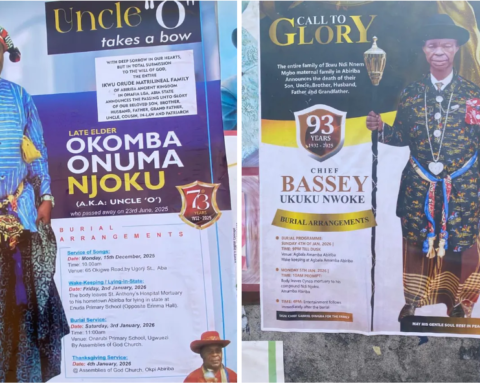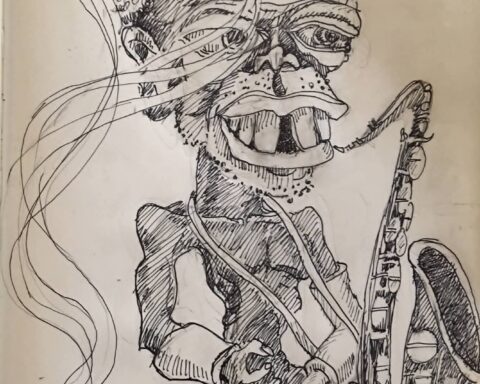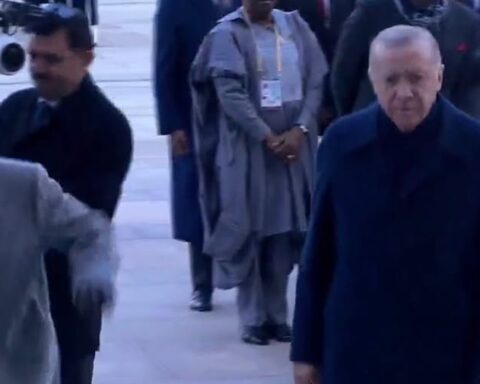By Dr. Charles Obiajulu Ugwu
There is a question I have come to fear more than any other: what really is wrong with Nigeria? Not the textbook responses we have rehearsed into clichés as corruption, bad leadership, poor institutions, lack of infrastructure.
These are symptoms, not diagnosis. Scratch beneath the excuses, walk through the chaos of our daily lives, and you will meet the fracture at the heart of our degeneration: the Nigerian, whether rich or poor, educated or illiterate, religious or irreligious, has been wired to see his fellow citizen not as partner in destiny but as prey to be consumed when chance allows.
This is the scandal of our national existence. We are locked in a permanent game of predator and prey, each of us oscillating between the two roles depending on circumstance. When elevated by position or opportunity, we bare our fangs with ruthless efficiency. When cast down or cornered, we bide our time, resentful but patient, waiting for the wheel to turn so we too may feed. It is a jungle logic masquerading as national life. It has corroded trust, paralyzed progress, and ensured that every attempt at nationhood collapses into the same old dance of plunder and despair.
It is time to strip the mask and confront this fracture for what it is: not a mere cultural quirk, not a survival instinct exaggerated, but the death-spiral of a people who have forgotten how to build a home together.
The Predator’s Compact
Look closely and you will see the same pattern repeated across all layers of Nigerian society.
The politician, who campaigns with poetic promises, enters office and promptly converts public trust into private cashflow. His constituents are not citizens in his eyes but a herd to be milked. To serve is laughable; to plunder is expected.
The pastor, called shepherd, manipulates his flock into sowing seed after seed into his ministry while their own children cannot afford school fees. His pulpit becomes a stock exchange of guilt and miracle, salvation commodified, prayer taxed.
The business tycoon builds his empire not on innovation or service but on cornering import licenses, exploiting monopolies, or over-invoicing contracts. He flourishes not by creating value but by feeding on the system.
The market woman who looks simple and harmless will, on seeing a naive buyer, double her prices and defend it as cleverness. The bus conductor will extort fares and hurl abuse when confronted. The civil servant, poorly paid, creates an entire industry of bribes just to release files.
Everywhere you look, the logic is the same: if you can be eaten, you will be eaten.
This is what I call the Predatory Compact which is the unspoken but binding agreement Nigerians have with one another: I will eat you if given the chance; if not, I will endure until my own turn comes. It is a covenant of mutual cannibalism that poisons every institution we try to build.
What It Costs Us
The toll of this predatory loop is staggering, not only in economics but in the very architecture of our collective psyche.
First, it destroys trust.
No society can function where every handshake conceals suspicion, where every transaction is a potential ambush. Trust is the oxygen of community; without it, cooperation suffocates. And yet in Nigeria, suspicion is our default setting. We trust no one, not leaders, not neighbors, not even family. This is why we barricade our homes with iron gates, why contracts are written in redundant clauses, why partnerships collapse before they begin. In a land of predators, trust is suicidal.
Second, it squanders time.
Progress requires continuity, but predators live for immediacy. The politician loots as if Armageddon arrives tomorrow. The contractor cuts corners because his only horizon is today’s profit. Every reform collapses into another scam before its roots can hold. So we restart endlessly, trapped in a cycle of failure masquerading as fresh start. Fifty years of oil wealth, and still no reliable electricity because each attempt became a feeding trough.
Third, it cripples the psyche.
Perhaps the most brutal cost is psychological. Nigerians have become habituated to cynicism. Hope is dismissed as naivety, honesty as foolishness, sacrifice as self-betrayal. When you tell a Nigerian child that hard work pays, he looks at the politicians driving convoys and knows the lie. When you urge a graduate to keep faith, he sees the dullard with connections already in a plush office. What emerges is a society of the disillusioned, where the brightest talents either flee or learn quickly how to prey.
Stories That Mirror Us
Consider the case of the pensioner in Benue who collapsed at the gate of his local government office. He had come to collect his arrears, delayed for months by bureaucrats who insisted on a “facilitation fee.” As his body was carried away, one official muttered that “life is like that.” To them, he was prey too weak to resist, unworthy of dignity.
Or the young man in Lagos who took an okada at night and, after haggling a price, was still abandoned midway when the rider demanded more. His protest was drowned in threats. “Oga, if you no pay, na bush I go throw you enter.”
Or the story of a megachurch in Abuja that raised billions for a “kingdom university” but twenty years later, no student has entered its gates. The funds have financed jets, mansions, and empires. The faithful remain prey, consoled with sermons about delayed blessings.
These are not anomalies. They are the bloodstream of our society, pumping predation through every artery of our national body, delayed; it is impossible. Because development requires a shared belief that tomorrow is worth investing in. It requires trust in the continuity of institutions, in the fairness of rules, in the safety of one’s labor. Nigeria has none of this.
Every project is built as though it may collapse tomorrow, because collapse is expected. Roads disintegrate months after commissioning because the contractor built not for posterity but for profit. Hospitals become morgues because procurement was inflated and medicines siphoned. Schools rot because the funds meant for them have already built another mansion in Dubai.
Here lies the reason why, despite wealth, Nigeria remains stunted: the logic of predation is short-term, narrow, and selfish. It has no patience for building. It consumes the seed rather than planting it. It devours the fruit before it ripens.
Comparative Mirrors
Other nations have faced corruption, poverty, even war. But what separates their trajectory from ours is the presence or absence of a social covenant. South Korea, after war and devastation, rebuilt on a collective belief in national destiny. Rwanda, scarred by genocide, undertook an intentional moral and civic reorientation. Singapore, bereft of resources, forged a compact around discipline and mutual accountability.
Nigeria has resources, talent, population, faith. What we lack is the covenant. Our compact is predatory, not regenerative. And so, unlike these nations, our cycles do not spiral upward into progress but downward into degeneration.
The Psychology of Predation
To understand how dangerous this is, one must grasp its psychological architecture. Predation trains the mind to believe only in power and opportunity. It corrodes empathy. It destroys the very possibility of community.
Imagine a society where every child grows up watching the predator glorified—the looter celebrated, the manipulator applauded, the sharp dealer envied. That child internalizes the lesson: survival means feeding, not building. Soon, values collapse. A teacher justifies extorting students because his own boss is stealing his salary. A doctor demands “appreciation” before treating a patient because he knows the system does not reward honesty. A citizen cheats because he assumes he is already being cheated.
Thus, predation is not just action; it is a mindset, a reflex, a national instinct. And it ensures that every new generation is born into the same vicious loop.
The Nationhood That Cannot Emerge
Here is the blunt truth: a people trapped in predatory logic cannot form a nation. At best, they can form a territory with borders and a flag. But nationhood is more than geography; it is a covenant of mutual flourishing, a recognition that the fate of one is bound to the fate of all.
Nigeria, as it stands, does not have such a covenant. We are a collection of hunters, each waiting for his own season. We do not build commons; we loot them. We do not invest in posterity; we mortgage it. We do not ask, what will sustain us as a people? We ask, what can I grab before it is gone?
And so, what we call “Nigeria” is not yet a nation. It is a hunting ground.
Breaking the Cycle
What then is to be done? Can a people trapped in predation be rewired for regeneration? History suggests yes—but only through radical rupture, not cosmetic reforms. Nigeria needs nothing less than a Moral Re-engineering Project—a deliberate effort to dismantle the predatory compact and replace it with a regenerative one.
This begins with four pivots:
1. Reframe success. Ill-gotten wealth must lose its glamour. A man who loots should be despised, not envied. Society must stop rewarding the predator. Media, religion, education all must recode the Nigerian imagination to honor builders, not eaters.
2. Rebuild trust. Institutions must be designed for fairness, not just efficiency. When the weak are consistently protected from the strong, when justice is predictable, trust slowly returns.
3. Restore covenant. Religion must stop monetizing faith and return to moral conscience. Culture must elevate solidarity above sharpness. Education must prioritize citizenship over mere credentialism.
4. Reinforce consequence. Predation thrives where impunity reigns. Consequences must become inevitable, not negotiable. A nation cannot flourish if crime is always profitable.
A New Compact
The future of Nigeria depends on whether we can forge a new covenant: The Regenerative Compact. This compact will redefine the Nigerian not as predator or prey, but as partner. It will teach that the success of one is tied to the success of all. It will demand sacrifice for posterity, not plunder for immediacy. It will elevate dignity above cunning, community above greed.
Such a compact is not naïve utopia. It is the foundation of every successful nation. Without it, no constitution, no election, no reform will endure.
A Closing Charge
Let us not deceive ourselves: the fracture is deep, the cycle strangling. But the first step to healing is brutal honesty. And the truth is this: we are the problem before they are the problem. The politician’s greed is only the amplified version of the citizen’s opportunism. The pastor’s manipulation is only the sanctified version of the trader’s deceit. The civil servant’s extortion is only the bureaucratic version of the market woman’s sharpness.
Until we break this predatory instinct at every level, we will remain condemned to a cycle of decadence masked as survival.
The call, therefore, is urgent: despise the predator’s glory. Defend the prey’s dignity. Rebuild a covenant where Nigeria is no longer a hunting ground but a home.
If we do not, we will continue to live in asphalt jungles, with skyscrapers but no civilization, with convoys but no conscience, with churches but no covenant.
But if we dare, if we commit to breaking the predator’s compact, then perhaps for the first time in our history, we may yet stumble into nationhood.
Because nationhood is not about territory. It is not about population. It is not even about resources. Nationhood is about covenant.
And until Nigeria learns this, we will keep feeding on each other, carcass by carcass, until nothing is left.
About the Author
Dr. Charles Obiajulu Ugwu writes from Lagos



























